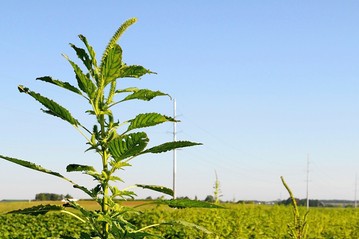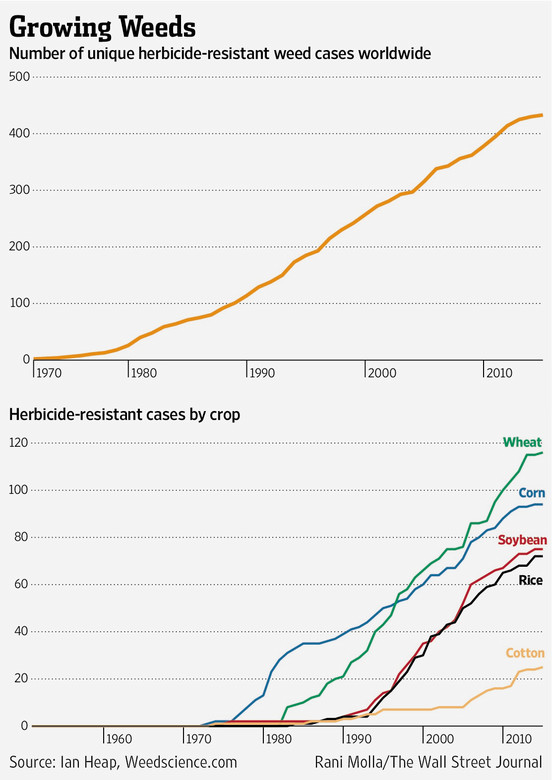The Rise of the ‘Super Weed’ Around the World
“Super weeds” are becoming increasingly common.
-

- Associated Press
Texas cotton growers are petitioning the Environmental Protection Agency to let them use propazine, an alternative herbicide to Monsanto’s glysophate, which is currently used, to combat a “super weed” that has developed resistance to it. According to the Weed Science Society of America, these herbicide-resistant weeds were first reported in the 1950s — soon after farmers began using the first major synthetic herbicides — and are on the rise.
It’s a case of typical evolutionary processes: A farmer sprays her field with an herbicide, most of the weeds die, a few that are best adapted for the herbicide will live on and reproduce. After repeated herbicide use, these super weeds can actually come to dominate the weed population. Weeds have evolved to be resistant to herbicide after herbicide, starting with synthetic auxins, then triazines, then ACCase inhibitors, then ALS inhibitors and now glyphosate, the main ingredient in Monsanto’s Roundup, according to Director of the International Survey of Herbicide-Resistant Weeds Ian Heap, who helps run Weedscience.com, the central repository for scientifically backed, peer-reviewed herbicide-resistance cases.
The increase in super weeds is troubling for everyone. Farmers worry they’ll lose their crops while environmentalists worry about these various toxic herbicides leaching into groundwater. From the article:
“Pigweed is a really serious problem for farmers,” said Bill Freese, science policy analyst at the Center for Food Safety. “But propazine is not the solution. We need to have farm practices that don’t create resistant weeds in the first place, so we don’t have to resort to toxic herbicides to treat them.”
U.S. farmers have had some success in controlling pigweed using a growing arsenal of herbicides, but Texas’s proposal underscores the challenge farmers face in keeping the weed from strangling their crops.
“Weed resistance is of utmost concern for us,” said Ned Meister, director of regulatory activities for the Texas Farm Bureau. “The purpose of the request is to put another tool in the toolbox for farmers to address weeds that are resistant to other chemicals.”
According to Mr. Heap, “Unfortunately we have not seen any new herbicide sites of action in over 30 years, and it is not clear that any new ones are in the pipeline.” This means that the focus is shifting to preventing resistance to herbicides in the first place. According to Steven B. Mirsky a research ecologist at the USDA’s Agricultural Research Service, there are a number of ways to reduce herbicide resistance using weed-management tools such as cover crops. Heap also suggests rotating crops and herbicides to avoid resistance. Science Policy Director of National and Regional Weed Science Societies Lee Van Wychen suggested one of his favorite quotes: “If you had great weed control this year, do something different next year!”
-
Pesticides and the like along with all the toxic chemicals we use on a daily basis (oh and prescription meds.) and flush into our water system has literally ‘killed’ a lot of the rivers (and parts of the ocean are ‘dead’) around the world. Our fish supply has become and is getting more toxic. Water is the life blood of the earth and mankind.
We have a farm with two fresh water springs and am so thankful to have unaltered water right out of the mountain. We don’t use chemicals in the garden. Some weeds are food for pigs, the weed/seed tops are good for chickens, some weeds we eat in salads. Newspaper and cardboard keep the weeds down in our little gardens and then turn into compost
- Copyright ©2014 Dow Jones & Company, Inc. All Rights Reserved.
http://blogs.wsj.com/numbers/the-rise-of-the-super-weed-around-the-world-1458/

What this article fails to mention, or perhaps takes for granted, is that 91% of Texas cotton production is now genetically modified. These alterations have allowed farmers to douse their crops with herbicides such as Roundup (glyphosate), causing accelerated rates of herbicide resistance and so-called ‘superweeds’. Current methods of agriculture are creating the very problems that genetic engineering is being used to address. Increases in pests, weeds, diseases, and malnutrition are all symptoms of an agricultural industry that has lost touch with the balance of nature. As a result, we see these ever-increasing problems being met with ever-increasing levels of toxicity. Propazine is a banned herbicide, which Texas cotton growers have submitted an ‘exemption request’ to the Federal Register to be allowed to bring back into use. Why? Because their fields contain a plant which the industry calls ‘pigweed,’ but which is actually a species of amaranth, a highly nutritious vegetable, oil, and grain crop.